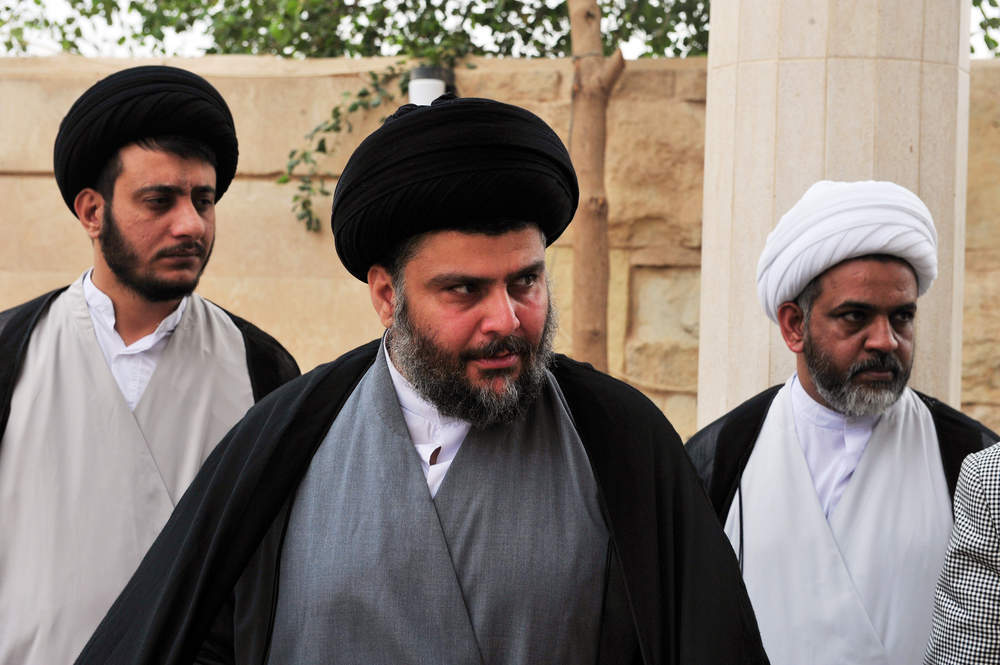
Jubilation erupted in the streets of Baghdad yesterday as news broke that Shia cleric, Moqtada al-Sadr’s party was on course for victory in Iraq’s general election.
Sadr’s supporters poured into the capital’s Tahrir Square in downtown Baghdad to celebrate, setting off fireworks, honking horns, and waving flags and banners emblazoned with anti-Iran and anti-US slogans.
According to preliminary results released by the Independent High Electoral Commission, Sadr’s party has won 95% of the votes counted in 10 of Iraq’s 18 provinces, winning 1.3 million votes.
In second place is thought to be paramilitary commander Hadi al-Amiri, who has garnered some 1.2 million votes.
Prime minister Haider al-Abadi is trailing in third place and appears to be set for a shock defeat. He was favourite to win going into the poll.
Sadr’s Sairun, or Marching Towards Reform list, formed an alliance with six secular groups, including the Iraqi Communist Party.
While Sadr will not be the next prime minister, as he did not run for office, the results will kick-off the race for the country’s next leader.
Tom Pugh, a commodities specialist from Capital Economics, said the shock win for Sadr’s party was unlikely to rock the global oil market:
Unless they have a dramatically different policy on oil production, there wouldn’t be any reason to expect oil production to change or global oil supply to change. I don’t think there’s be any impact on prices.
Robin Mills, CEO of Gulf-based consultancy Qamar Energy, said the result was “not particularly positive for international investment”.
Last year, the powerful Iraqi cleric Moqtada al-Sadr held a series of meetings with Saudi Arabia’s heir apparent, Prince Mohammed bin Salman, heralding warm relations with Riyadh.
Mills said:
This signals an open door to Saudi Arabia, so that would be positive for cooperation and the Opec deal.
They’ll continue cooperating with the deal, and they’re not going to be hostile to Saudi Arabia.
At the end of 2016, the Organization of the Petroleum Exporting Countries (Opec) and other large oil producers agreed to a pact to cut their combined oil output by 1.8 million barrels per day to reduce bloated global oil inventories and boost dwindling crude prices.
Who is Moqtadr Al Sadr?
Moqtadr Al Sadr, 44, hails from a powerful family. Both his father and uncle were assassinated for their defiance of Saddam Hussein’s regime.
Sadr also led two uprisings against US forces which toppled Iraqi dictator Saddam Hussein in the 2003 invasion and is one of the only candidates to distance himself from Iran.
Ranj Al Alaaldin, visiting fellow at the Brookings Institution, said the Sadrist victory is historic on many levels:
The Sadr/Communist victory will go down as one of history’s greatest ironies the Sadrist movement emerged from a Shia movement born in the ’50s in response to the rise of the communists, whose demise quickly followed. Iraqi politics never ceases to amaze.
This is someone who’s always been in the shadow of his father, has been ridiculed, betrayed and confronted at every turn by his rivals, Iraq’s armed forces, the US, Iran and members of his movement who went on to establish splinter groups.
Over to you, Muqtada al-Sadr. #IraqiElections pic.twitter.com/i0kcoFe4cM
— Ranj Alaaldin (@RanjAlaaldin) May 13, 2018







